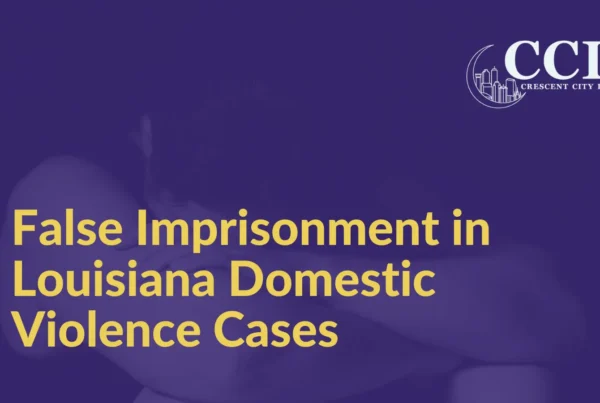Curious about how domestic abuse battery can escalate to a felony charge in Louisiana? Let’s dive into this important matter together.
In Louisiana, authorities take domestic abuse very seriously. It’s considered a punishable offense that can even elevate to a felony, potentially leading to the forfeiture of firearm rights.
Cases of domestic violence are emotionally charged and necessitate careful handling. Nowadays, heightened awareness and discourse surrounding domestic violence have encouraged more victims to come forward against their abusers. While this societal awakening is a positive development, it has also resulted in a rise in false allegations.
Facing a domestic abuse battery accusation is a serious charge in Louisiana. If you or someone you care about is confronted with such allegations, seeking guidance from a seasoned Louisiana criminal defense attorney is crucial. Attorney John Radziewicz can help you navigate your options and explore potential defenses.
What is Domestic Abuse Battery?
In Louisiana, domestic abuse battery is described as any deliberate use of force or violence by one household or family member against another, as outlined in LA Revised Statute 14:35.3.
Meanwhile, under LA Revised Statute 14:37.7, domestic abuse aggravated assault is characterized as an assault with a dangerous weapon perpetrated by a household or family member against another individual within the same household or family.
Felony Domestic Violence Cases
Domestic violence charges can escalate to felony offenses under certain circumstances:
- If the victim is pregnant.
- When the abuse occurs in the presence of a child aged 13 or younger.
- If strangulation and/or burning are involved.
- When it’s the offender’s third, fourth, or subsequent offense.
These situations carry significant weight in the eyes of the law and can result in harsher penalties.
What is Strangulation?
Louisiana’s domestic abuse battery law, R.S. 14:35.3, specifically addresses strangulation as a severe form of violence within domestic relationships. Strangulation, as defined by the statute, involves intentionally impeding the victim’s normal breathing or blood circulation by applying pressure to the throat or neck or blocking the victim’s nose.
This statute acknowledges the gravity of strangulation in domestic abuse cases by imposing stricter penalties when this form of violence is involved.
Strangulation is among the most deadly forms of domestic abuse, as it cuts off oxygen supply to the body by exerting pressure on the neck. This pressure can close off blood vessels and air passages, leading to rapid loss of consciousness and even death within minutes.
Moreover, the repercussions of strangulation extend beyond immediate danger. Survivors may suffer long-term effects such as brain damage, miscarriages, or heart attacks, which can manifest days or weeks after the assault.
Understanding the seriousness of strangulation in domestic abuse cases is crucial for ensuring the safety and well-being of survivors and holding perpetrators accountable for their actions.
Signs and Symptoms of Strangulation
Recognizing signs of strangulation is crucial for understanding and addressing domestic abuse. Some clear indicators include self-inflicted neck injuries as victims struggle against their assailants. Other signs to watch for include:
- Small red spots known as petechiae on the scalp, face, nose, eyeball, or ears.
- Evidence of physical struggles like a fractured skull or pulled hair.
- Visible injuries such as a bloody or broken nose, bruises on the mouth, swollen lips or tongue, cuts, or abrasions.
- Scratch marks on the neck and chin, or ligature marks indicating pressure around the neck.
Symptoms that victims may experience include:
- Changes in their voice due to trauma to the throat.
- Difficulty swallowing or breathing, indicating potential damage to the airway.
- Blurred or lost vision, which could result from pressure on the blood vessels in the neck.
- Hearing loss, possibly due to trauma to the head or ears.
- Memory loss or loss of consciousness, indicating severe distress.
If you find yourself facing domestic abuse charges, seeking guidance from an experienced criminal defense attorney is essential. They can help you navigate the legal process and develop a robust defense strategy tailored to your case, offering the best chance of minimizing potential consequences.
Possible Sentences For A Domestic Violence Conviction
In Louisiana, domestic violence convictions entail various penalties, including fines, jail time, probation, mandatory classes, and community service. The severity of the offense determines whether it’s classified as a felony or misdemeanor, with prior convictions influencing the charge.
For a first offense, domestic abuse battery incurs a fine of $300 to $1,000 and imprisonment of 30 days to six months. A second offense carries a fine of $750 to $1,000 and jail time of 60 days to one year, often with probation, classes, and community service requirements.
Repeated offenses can elevate the charge to a felony, leading to more severe penalties. Certain circumstances, such as the presence of pregnant victims, children under 13, or instances involving burning or strangulation, can escalate a first offense to a felony.
Domestic abuse aggravated assault always results in felony charges, with sentences ranging from one to five years in jail.
Furthermore, domestic violence convictions can trigger long-term consequences, including the loss of firearm rights and immigration issues, potentially leading to deportation or inadmissibility to the United States. Finally, domestic violence convictions cannot be expunged!
Defense Against Domestic Abuse Charges – Contact Crescent City Law Today!
At Crescent City Law, we understand the complexities surrounding domestic violence cases. We’ve witnessed scenarios ranging from genuine self-defense to misunderstandings that spiral into serious accusations.
You don’t have to navigate these charges alone. Let us stand by your side and offer you the support you need while advocating for your rights. Contact us today at 504-264-9492 to schedule a consultation.






